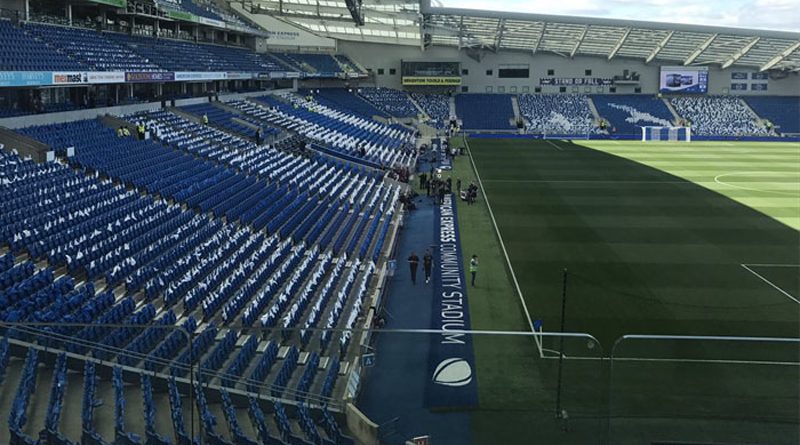What does a European Super League mean for Brighton?
Football as we know it could be about to change forever. Out of greed and gluttony, the Premier League’s big six have agreed to form a new European Super League which will have far reaching consequences for the sport, impacting everyone including Brighton & Hove Albion.
When they say European Super League, what they really mean is a European Money League. There is nothing super about having Tottenham Hotspur involved for example, who last won an English league title in the 1960s.
Since then, Ipswich, Everton, Leeds, Derby, Forest, Villa, Blackburn and Leicester have been crowned champions. Make no mistake, this is a competition designed to make the richest clubs richer.
Liverpool, Manchester United, Manchester City, Chelsea, Spurs and Arsenal have signed up for the new competition alongside AC Milan, Atletico Madrid, Barcelona, Inter Milan, Juventus and Real Madrid.
It seems remarkable that one-third of the clubs in a so-called “European Super League” have been beaten by a small team like Brighton in the past four seasons.
If Brighton had billions of pounds in the bank, then the Albion would probably have been invited to get involved. What might the club have said?
No you would hope, but then again they publicly backed the Premier League pay-per-view plan initially, with Paul Barber’s infamous quotes of, “We are a business and unfortunately, football fans always want everything for free” a reminder that when money talks, there are very few in football who can resist it.
The Albion though will remain a mere Premier League club. The ESL is currently being billed as a midweek competition with the teams involved still taking part in their domestic league at the weekends, although right now it seems impossible that will be the case.
Any new competition needs FIFA, UEFA and Football Association approval. Various governing bodies around the world have made it very clear at this early stage that approval will not be granted.
Clubs who are involved will be banned from domestic competitions and players who take part could find themselves no longer able to compete at international level, in World Cups or European Championships.
The whole thing looks a complete mess and it is only going to get much more murky as fans and clubs come to loggerheads, led by figures like Gary Neville who launched into a quite wonderful rant on Sky Sports when news of the plans first broke.
So, what would a European Super League mean for Brighton? Here are four ways it could impact on the Albion.
The value of the Premier League drops
Let us get the bad news out of the way first. If the big six are banned from taking part in the Premier League, then the value of the product drops quite considerably and suddenly, broadcast income becomes nowhere near as much as it is now.
This is a particular issue when it comes to the lucrative international market. Brighton v Burnley or West Brom v Fulham have appeal to Sky or BT Sport because there are fans of those clubs in a British audience who will want to watch.
In Beijing, Bangalore and Bamako, people are hardly rushing out to watch Sheffield United v Newcastle. International fans are only interested in the big six by-and-large, so take them away from the Premier League and suddenly television networks around the world will be less invested in English domestic football and more so in a European Super League.
Football fans in England can talk about boycotting the ESL as it will destroy the 130 year old English football pyramid. Fans in China, India or Mali have little care about the impact on Football League founder members like Accrington Stanley and Notts County.
Less money coming in from broadcasting contracts will be bad news for the whole of football. Brighton’s 2019-20 accounts showed that the club made £89.9 million from television rights despite having to pay rebates due to the late completion of the season.
The Albion’s total wage bill in 2019-20 was £103.2 million. In a normal pre-Covid 2018-19 campaign, Brighton had broadcast revenues of £113.5 million and paid out wages of £101.6 million.
You do not need to be a qualified accountant to see that less television money will leave a serious black hole in the finances of football clubs across England, especially when so many have wage bills that are dangerously high compared to income.
Brighton are better placed than most to ride out the impact of a European Super League thanks to the generosity and deep pockets of Tony Bloom.
Other clubs who are not so lucky will be in trouble, especially in the Championship where wages-to-turnover are already verging on suicidal levels.
If the value of the Premier League drops, then that trickles down to the Football League. The European Super League could quite literally force clubs out of business.
Domestic football becomes a more open competition
The financial side of a European Super League is the one major drawback. If domestic football can ride it out, there do appear to be numerous upsides for the rest of us peasants and plebs to the big six buggering off to form their own competition.
Brighton could even find themselves winning a major trophy. Without the dominance of the big six, English football would become much more open, giving the so-called smaller clubs the chance to lift silverware and compete in Europe.
Take Manchester City out of the equation and Brighton might well have won the FA Cup in 2019. Leicester City and West Ham United would be battling it out for the Premier League title this season if Manchester City and Manchester United were not occupying the top two spots.
Four of the English teams signed up for “Super League” being below Leicester and West Ham in the table is another reason why it is happening.
Liverpool, Chelsea, Spurs and Arsenal are in danger of missing out on the Champions League next season because Brendan Rodgers and David Moyes are doing better jobs with less resources.
Leicester and West Ham are proof that money does not always buy you success in football and the richest clubs do not like that, so their solution is to set up a closed-shop competition where they cannot be embarrassed by smaller teams finishing above them.
The big six have had a monopoly on winning virtually everything in English football for a long time now, which is why Leicester’s title triumph and Wigan Athletic winning the FA Cup are so memorable.
One of the most captivating things about sport is unpredictability. If the big six want to play only each other in a league of 12 in which the majority of games become meaningless because there is no threat of relegation, then they are going to a competition with no unpredictability or excitement.
The Premier League meanwhile will become a competition where half the clubs involved are suddenly in with a chance of winning it. Lewis Dunk lifting Brighton’s first English title becomes more than a dream had after a heavy night of eating cheese.
Brighton players will have better international opportunities
Speaking of Dunk, his chances of playing for England – and those of his Brighton teammates – will increase greatly if the big six depart and their assets are banned from international representation.
Okay, maybe not Dunk. Gareth Southgate would still rather pick someone from the Dug and Duck Reserves in Sussex Sunday League Division Five than give Dunk a call-up.
Other Brighton players though would be in with a shot of turning out for the Three Lions. Adam Webster, Ben White, Tariq Lamptey and Solly March would be on the verge of England recognition and as we know from Dunk’s brief international experience, it is a genuine honour to see Brighton players turning out for our country at Wembley.
Big name players could sign for Brighton
The ban on players involved in the European Super League from competing at international level could work the other way, too. Whilst money talks, there are still those who would rather end their career as an England World Cup winner than having earned more cash in the ESL.
Those players will have to move to clubs still playing in their domestic leagues to live that dream. Spurs might be heading for the ESL, but if Harry Kane wants to become only the second man in history to captain England to a World Cup, then he will have to leave.
Paris Saint-Germain, Bayern Munich and Borussia Dortmund would be the destinations of choice for many of these world-class players as the biggest clubs not to sign up to the European Super League.
All three have been very shrewd in that regard; if it does all go tits up for the ESL, they are well positioned to profit by not having committed to a competition that is about money.
Brighton and the rest of the Premier League could also find themselves in a position whereby they can sign players who were previously out-of-their-league.
Imagine Harry Kane in this Brighton team which creates so many chances, presuming Graham Potter did not play him at left wing back or something equally bizarre.
The European Super League does not have to be the bad news story that a lot of people are saying. If the big six want to start their own closed-shop, private competition won by the same couple of teams every season with the other 10 having nothing to play for, then let them get on with it.
Not watching Arsenal and Spurs drawing 0-0 in a 9am kick from Qatar in the battle for the ESL wooden spoon in the 2025-26 season whilst Brighton are crowned Premier League champions later that day? Doesn’t sound that bad to me.





The so-called “Top 6” – those 6 that arrogantly regard themselves as such – say that they cannot survive financially without the European Supper League. For me, this illustrates a time bomb that has been ticking for some time now, and maybe is about to explode, and that is the huge cost appearing on clubs’ balance sheets of the widespread obscenely inflated players’ salaries, and the related crazily high transfer fees. Instead of destroying football as we know it – i.e. as the man in the street, the average supporter knows it, for all clubs, not just these 6 – a way must be found to rein back these enormously insane outlays. Perhaps then the “Top 6” will start to clear more money, but as a result of cutting unrealistic costs, not by breaking away from everyone else.
Clubs must stop thinking that they have to pay astronomically high fees in order to get the right talent, and place more emphasis on good coaching. Utopia ? The long-present trend of exponentially rising salaries cannot continue. How about Boris Johnson passing legislation to reduce at a stroke the “Top 6” salaries by 80%. That should help the balance sheets !
Football must stop thinking about how well we reward these athletes, who supposedly love the work that they do and are in the privileged position of getting paid to keep fit, and start to consider the supporter more, making following the game more affordable for the fan, as well as relieving pressure on the smaller clubs to keep up with the richer clubs and having to meet the same absurd salaries, which of course they mostly can’t. Many clubs, in trying to “keep up”, are running a tightrope of existence as a result, not just the Premier League, and are dangerously close to falling into a black hole, meaning that that club’s fans will no longer have a home town club to support.